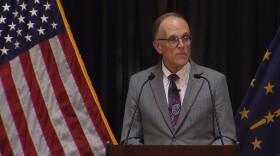From the Wabash to the Ohio, Hoosiers throughout history have built their livelihoods and cultures around rivers.
That’s why Indiana Humanities, a nonprofit based in Indianapolis, is highlighting the state’s waterways with a documentary film series.
“We felt that it was important to tell these stories, so that people can see themselves represented in the film, see their communities represented,” said Jackie Rodriguez, the group’s communications manager. “And then also raise awareness about key issues that our environment is currently facing, our waterways are currently facing.”
The group is hosting free screenings of six original short films about Hoosiers’ relationship with rivers and the creatures that live in them. The tour is making a stop in Corydon on Wednesday night, where some of the filmmakers will answer questions from viewers.
The films feature stories from throughout the state, including a couple based in Southern Indiana.
Katelyn Calhoun’s documentary, Hellbender in the Blue, details efforts to reintroduce North America’s largest salamander to the Blue River, which flows through Crawford, Harrison and Washington counties.
“They’re kind of slimy and ugly, and it's wonderful,” Calhoun said. “I'm a big fan. And I have an affinity for making what was seemingly an unlovable thing lovable when it comes to my films.”
The hellbender salamander can grow to more than two feet long. They’re found throughout the eastern United States, in dwindling numbers. In Indiana, they’re endangered.
Calhoun said the people working to restore the hellbender population are just as much the stars of the documentary as the slimy creatures themselves.
“It’s a bit based out of Purdue, but there's folks in Indianapolis working on it,” Calhoun said. “There's folks in Evansville, there's folks in Fort Wayne that just are helping rear these animals in the zoo, so that they can then release them in the Blue River. So even though it's really only found in the Blue River right now, it's all over the place that people are trying to bring them [up] to their former numbers.”
The Net Makers, directed by Hannah Lindgren, showcases two traditional fish net makers in Southern Indiana. One of the subjects has spent his entire life in the trade, another is the fifth generation of his family to work in it.
The men use their creations to catch fish in the White and Wabash rivers that they then sell in their community. Lindgren said the documentary is about their relationship with the craft and the changes they’ve seen in the environment during their careers.
“It's really a dying art,” Lindgren said. “These men craft together these hoop nets by hand, sometimes with thousands and thousands of individual knots.”
Lindgren said she had a special emotional connection to the topic, because her grandfather is a Southern Indiana native. He died during filming.
“So I really felt just a kinship with these men, and they reminded me so much of him,” Lindgren said. “It was especially poignant for me, but I just felt like their story needed to be told. Nobody really knew about this craft, and they’re some of the last few people who are doing it.”
The screening in Corydon is one of the original nine planned stops of the Indiana Waterways tour, but organizers have since extended the series through the summer.
John Boyle is a corps member with Report For America, a national service program that places journalists into local newsrooms. John's coverage of Southern Indiana is funded, in part, by the Caesars Foundation of Floyd County, Community Foundation of Southern Indiana and Samtec, Inc.





